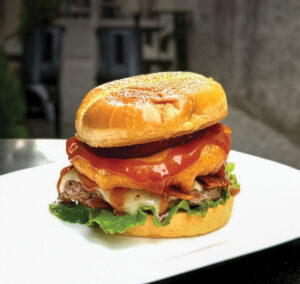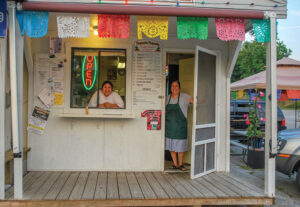
Nestled in the middle of peach and apple orchards and vineyards in southern Illinois is La Taqueria Pequena. Like the perfection of a just-picked ripe peach, Little House of Tacos is also about perfection, but in terms of simple, authentic Mexican food.
Pequena co-owner Maria Bartolo calls her food “indigenous cooking,” which comes from recipes handed down by her mother and grandmother.
It would be one thing to call this tiny eatery a taco stand, but from within this small, efficient kitchen in a converted portable shed, pure Mexican magic has enchanted new and loyal customers since it first opened in 2004.
Pequena offers typical Mexican fare, but Maria’s 50-plus years of experience make it like no other in the Midwest. About 17 miles south of Carbondale, the restaurant is one of the few easy to find along the Shawnee Hills Wine Trail. It’s a short drive to Flamm’s or Rendleman Orchards for desserts, sweets and fresh fruit.
Roots in the orchards
Maria is the boss of this house, but Pequena is a family affair. She and husband Fidel have lived more than 40 years in Cobden. They settled there from Cheran Michoacan, the Mexican state from where a majority of Union County migrant and immigrant workers come to work in the area’s orchards and vineyards. The Bartolos settled in Cobden because Fidel’s mother was already there.
Maria opened Pequena because she enjoys cooking. Fidel helped convert the shed into a working kitchen and conceived the name. Over the years, daughter Margarita was Maria’s right hand. Today son Esteban fills that role.
Esteban is a Cobden native and grew up in the restaurant, which opened when he was 7 years old. He and his mom typically work with one or two other family members or close family friends – after all, only so many people can fit in the kitchen.
Because the Bartolos’ roots run as deep as grapevines, Pequena is often a first stop whenever someone new from Mexico comes to the area to work.
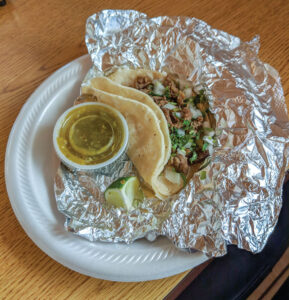
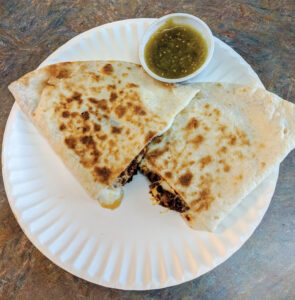
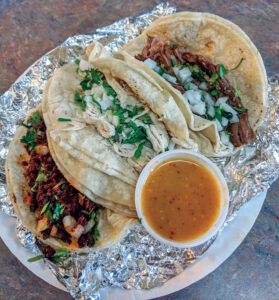
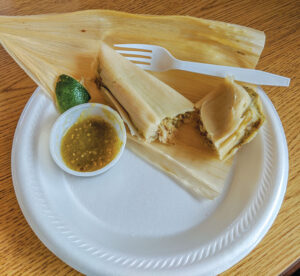
Always to go
All Pequena orders are served to go, with items neatly folded into foil packets like gifts. There are tacos, burritos, chili rellenos, tortas, and red and green salsa.
And then there are the tamales. Maria and her family handcraft each one, filling a handful of soft masa with a seasoned, slow-cooked pork filling, patting it with practiced hands into corn husks and then rolling it into shape for gentle steaming.
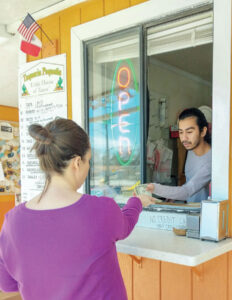
When the restaurant first opened, Maria used to go home, and after dinner, sit in front of the TV and make tamales. “We do it all here now,” Esteban says. “We don’t have any more energy once we get home.”
Many customers don’t realize how much work goes into making tamales. There is a standing request that anyone wanting a dozen or more should call ahead and place an order at least one day in advance.
There’s just enough room in the kitchen for her grill, counter space, refrigerators, a soft drink cooler, washing line and cash register. To the side of the kitchen is an air-conditioned dining area with six or so tables and a pass-through window from the kitchen to pick up orders.
On nice days, all picnic tables tend to fill up, as do the sidewalk ledges and pavilion tables in the park across the street. The line can also snake down the sidewalk.
If there is no line, one could stand at the order window and easily watch Maria prepare the items, which are carefully made one order at a time.
Esteban recommends first-time visitors “keep an open mind and remember things here are a bit more traditional than at other Mexican establishments. We don’t serve queso dip on everything, put cheese on every item or add sour cream. Everything’s more traditional.”
They do try to appeal to a broader customer base with such Tex-Mex items as taco salad and nachos.
As for bestsellers, Esteban mentions the tacos and tamales, “because that’s what most people know. I’d have to say that everything is our bestseller at this point.”
His favorite? “I cannot choose a favorite – I love them all.”




